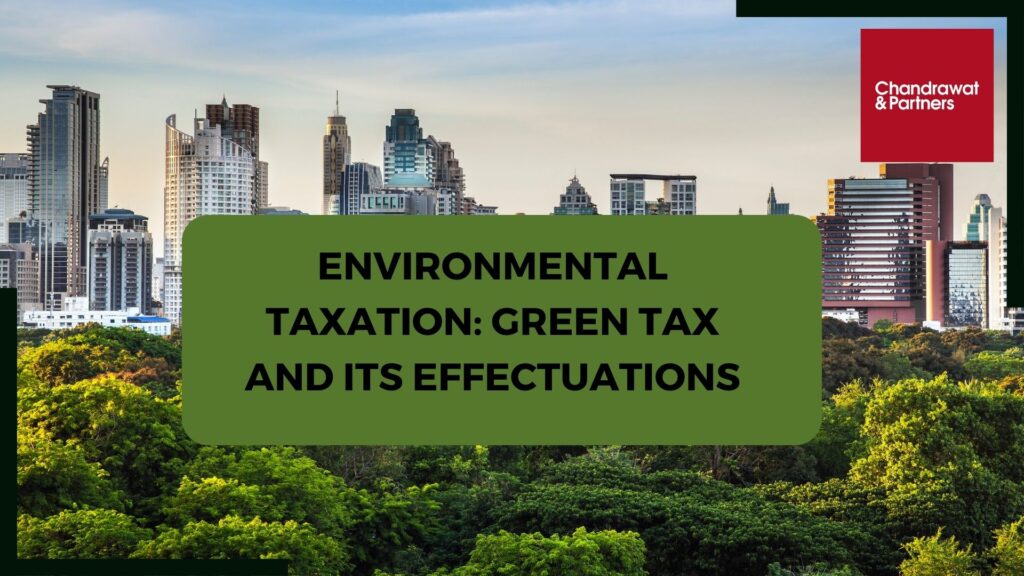Environmental taxation: Green tax and its effectuations in India
Overview of environment tax
An environmental tax, also known as an ecotax or green tax, is a tax imposed on activities that are deemed to be environmentally damaging with the goal of promoting environmentally responsible behaviour through financial incentives. Environmentally connected taxes are any mandated, unavoidable contributions made to the general government from tax bases that are thought to have a specific environmental significance. Energy goods, automobiles, garbage, measured or estimated emissions, natural resources, etc. are among the pertinent tax bases.
Environmental taxes are intended to stop or lessen detrimental activities, such as resource depletion or excessive consumption of toxic substances. The costs of the item for paying the tax will increase when the tax is well-targeted. The competitiveness of the local producer may be impacted by the imposition of charges on producers within one country or region that are not imposed on producers outside of that country or region.
Green taxes, often known as environmental taxes, are levied against items that pollute the environment or are used repeatedly. Different vehicles are subject to the environmental reimbursement charge which may be personal or commercial. Depending on the size of the vehicles, such an inexperienced tax is charged. The Organization for Economic Co-operation and Development (“OECD”) defines green taxes as explicit pricing mechanisms for environmental goods and services, provided through pollution taxes, resource taxes, transport taxes, or other fiscal instruments that reflect the costs, and benefits of environmental protection.
Importance of Green Tax
Any products or items that spread pollution are subject to a green tax, which is a type of excise charge. It is also known as a pollution tax or an environmental tax. In an effort to deter owners from operating outdated vehicles, a green tax for automobiles, bikes, and other vehicles was implemented. These older models frequently have higher emission rates, adding a significant amount of toxins to the environment.
Both personal and commercial versions of cars are subject to these levies. Furthermore, only diesel and petrol vehicles are subject to India’s green tax. Depending on whether a person is driving a personal or a commercial vehicle, different standards for green tax liability apply. The regulations in this regard are as follows:
- Commercial cars: The green tax on cars only applies to commercial vehicles that are more than 8 years old.
- Personal vehicles – If a car or bike is more than 15 years old, one must pay a vehicle green tax.
To deter people from using older, polluting vehicles, the government put a green charge on automobiles. This would help to reduce the amount of pollutants in the environment as a whole. The government would fight pollution levels by putting in place specialized pollution or emission monitoring stations, which would be funded by the tax money it receives. These stations would significantly aid in reducing air pollution.
Legal Implications of Green taxes
India has put into place a number of laws and policies that support the application of green fees as a way to promote environmentally friendly conduct. These laws and regulations include:
- The Air (Prevention and Control of Pollution) Act of 1981 prescribes the application of penalties, including green taxes, on industries that violate its rules.
- The Water (Prevention and Control of Pollution) Act of 1974 restricts the discharge of pollutants into water bodies. The Act limits the discharge of pollutants into the air and stipulates that industries that do so will be subject to fines and green taxes.
- The Energy Conservation Act, 2001: The Act stimulates the use of renewable energy sources and promotes the efficient use of energy in industry. Additionally, it calls for the introduction of a green tax on sectors that utilise too much energy.
- The National Green Tribunal Act, 2010: The NGT was created to make decisions, offer assistance and compensation for environmental harm caused by people or businesses. The Act gives the Tribunal the authority to impose green fees on polluting
- The Goods and Services Tax (“GST”) Regime: India’s GST system levies taxes on the production, marketing, and consumption of goods and services. The GST also includes a cess on products and services that harm the environment, such as coal, oil, and plastic.
A way forward
A green tax could is a good step in the direction of a single tax on emissions. Environment-friendly goods and process solutions can find lucrative markets thanks to economic incentives like green taxes. In order to achieve sustainable living in the face of issues like globalization, climate change, and aging populations while promoting inclusive growth, high employment, and equitable income distribution, a green tax system design is essential. Economic, social, and environmental considerations should be made while designing sustainable tax systems. It is possible to draw the conclusion that the early emphasis on the double dividend concept significantly reduced the impact of green taxes. It might be more effective and efficient to implement a green tax reform based on consumption taxes that are differentiated according to the environmental impact of products.
For more information or queries, please email us at
enquiries@chandrawatpartners.com




